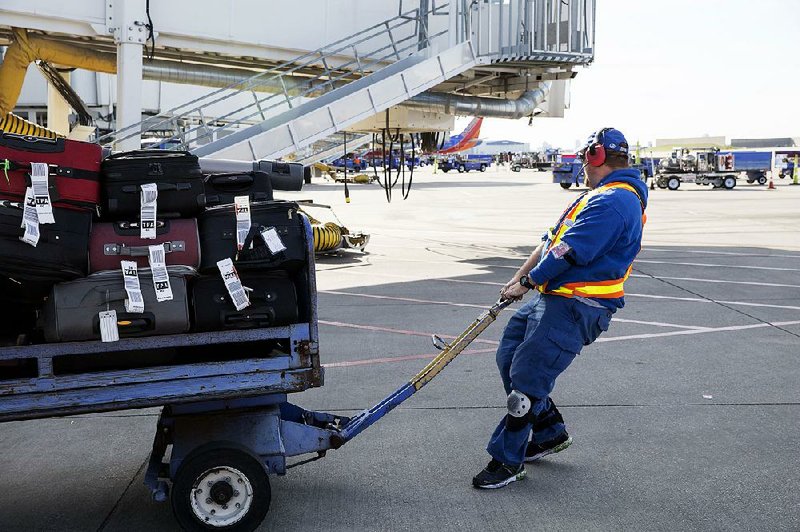Only days after monster storm Irma made landfall in Florida, canceling and delaying thousands of flights, the head of the world's largest airline appeared unfazed, voicing glowing optimism about the future of air carriers.
Speaking at an industry conference in Washington, D.C., Doug Parker, chief executive of American Airlines, said the effect of Irma and the earlier hurricane that tore through Houston will be short-lived.
"I don't anticipate a financial impact to us other than the near-term financial impact," he said. "I feel as good about this business as I ever have."
How could that be in a time when monster storms are more common -- and some fear that travel disruptions could become a regular occurrence amid quickening climate change?
Chalk it up to science, technology and profits.
The nation's $1.5 trillion airline industry is in the midst of one of its most financially stable eras in decades, which will help the biggest carriers absorb the short-term effects of the unusually destructive hurricane season. Increasing passenger demand and cheap fuel costs have been key in helping build the carrier's profit margins and cash reserves.
But advances in science and technology are also playing a role. Modern weather forecasting has improved to the point that airlines can now tell with high reliability the moment a storm is expected to reach a major airline hub, making it easier to cancel and reschedule flights.
"It has helped them to be prepared, move equipment out of harm's way and recover faster than in past decades," said Helane Becker, an airline analyst for Cowen & Co.
Although it is too early to estimate the final dollar cost of the two hurricanes, the nation's bigger airlines seem prepared to overcome the financial blow despite the storms' enormous effect.
From the end of August to the first week of September, Hurricane Harvey pounded South Texas, prompting the cancellation of 11,300 flights to and from airports in Houston, according to the flight-tracking website Flightaware.com.
United Airlines, the biggest carrier at George Bush Intercontinental Airport, and Southwest Airlines, the most dominant carrier at nearby William P. Hobby Airport, took the biggest hit from Hurricane Harvey.
About a week later, Hurricane Irma began to tear through Florida and the Caribbean, forcing the closure of 40 airports and the cancellation of 14,500 flights in and out of the state and the nearby islands.
As the biggest airline at Miami International Airport, American Airlines had to cancel more than 5,000 flights.
As the storm moved inland, an additional 1,100 flights were canceled from Hartsfield-Jackson Atlanta International Airport, the world's busiest airport.
The canceled flights represented a fraction -- less than two-tenths of 1 percent -- of the more than 16 million flights that take off each year in the U.S.
Still, the financial effect of the storms would, in previous times, have put a severe dent in the profit margins of most airlines, said Seth Kaplan, managing partner at Airline Weekly, a trade publication.
"At a different moment in history, this kind of impact could have made the difference between profits and losses," he said.
Instead, airline executives have been downplaying the effect on themselves and passengers.
The airlines are expected to lose money on some canceled flights but not all of them. On all canceled flights, passengers received full refunds and most of the airlines agreed to waive change fees for those passengers whose flights were not canceled but decided to stay clear of the storm.
"There's a blow, and we are going to absorb it," Gary Kelly, chief executive of Southwest Airlines, said at the Sept. 13 aviation conference. "We'll still be healthy. We'll take care of our people, and we'll take care of our customers."
American Airlines issued a report, two days after Hurricane Irma made landfall in Florida, saying that instead of a pretax profit margin of 10 percent to 12 percent, the carrier was now expecting a slightly smaller margin of 8.5 percent to 10.5 percent for the July-to-September quarter.
During the storms, weather forecasters were able to monitor the speed and direction of the hurricanes to give airlines a good idea when to begin canceling flights and where to dispatch the planes and crews to ride out the storm.
The National Oceanic and Atmospheric Administration now deploys a network of radar systems that scan the skies, satellites that take images from space, buoys on the sea to measure water temperatures and wave heights, and scores of weather balloons -- all sending data into super computers that conduct atmospheric modeling to predict the size, speed and direction of storms and hurricanes.
Those data allow carriers to avoid having planes loaded with passengers stuck at a storm-ravaged airport. During the recent storms, the carriers were able to cancel flights sooner and dispatch their multimillion-dollar planes to airports where they could avoid wind damage or undergo needed maintenance.
More accurate forecasts also made it easier for airlines to know when to relaunch flights after the winds subsided.
The changing nature of travel booking also has made it easier for air travelers to reschedule in the event of a weather disaster.
Not only has online travel booking outgrown booking through a travel agent, but more than half of all online reservations are made using mobile devices instead of a desktop or laptop computer. This means travelers can literally book and reschedule travel plans on the go.
Leisure travelers who were prevented by the hurricanes from flying to tourist destinations such as Walt Disney World in Orlando, Fla., or the Florida Keys either postponed their trips or made plans to fly to other vacation spots, industry experts said.
The biggest financial hit to the airlines will be the loss of those airfares booked by business travelers, who tend to buy more expensive first-class seats but are less likely to reschedule a canceled business trip.
Business on 09/27/2017
